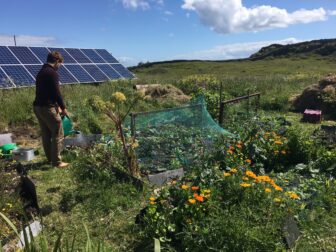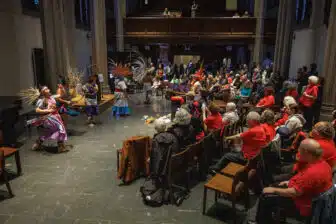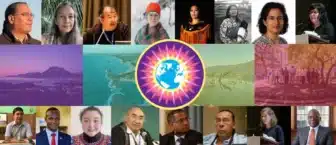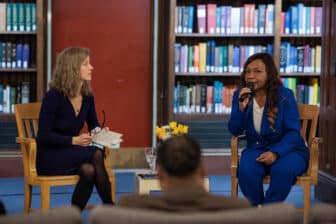
Freedom of Religion or Belief: Betty Lyons’ Remarks on the UN Special Rapporteur’s Report
Editor’s Note: On October 26, 2022, the Center for Earth Ethics hosted a forum of Indigenous and global leaders to discuss the key findings and recommendations of the report “Indigenous Peoples and the Right to Freedom of Religion or Belief.” This report was presented to the United Nations by Special Rapporteur on Freedom of Religion or Belief Ahmed Shaheed. Speakers included Fred Davie, Roberto Múkaro Borrero, Betty Lyons, Chief Dwaine Perry, Mona Polacca, Tadodaho Sid Hill, Nazila Ghanea, Karenna Gore, and Ahmed Shaheed. In her remarks, Ms. Lyons highlighted the Haudenosaunee Thanksgiving Address, the Doctrine of Discovery and the ongoing challenges that Indigenous communities face in the United States and beyond.
This transcript has been edited for length and clarity.
Betty Lyons: “Gaeñ hia uh”—that’s my original name. My colonized name is Betty Lyons, and I’m a proud citizen of the Onondaga Nation. First I want to acknowledge Chief Perry and thank him for allowing us to convene here this evening. To Mona [Polacca], our elder who has come to be with us tonight, too. Roberto Borrero, who is also a leader in his community that has joined us, as well. So I want to thank them for being here and being well.
To the Special Rapporteur, Ahmed Shaheed, for the Interim Report on the Freedom of Religion or Belief given at the 77th session, I humbly thank you for your important work. We will be using this document going forward. As I said earlier, it is refreshing and made me very hopeful—it’s a long time that we haven’t seen a lot of hope coming from some of the reports out of the UN. So, yes, thank you. We’re very grateful.
We acknowledge and send our gratitude for your dedication and efforts made and reaching out to Indigenous nations, peoples and communities to be open to our perspective on how we define, practice what is referenced as religions and belief. Freedom to practice or ceremonies, languages, cultures—they are intrinsic to the quality of our lives as Indigenous peoples. We feel it goes a step further. We believe that it is a value system, one which is needed for our mutual survival.
It is important to understand that the notions of religion and belief are two areas external to us as Indigenous peoples. It is not the belief, but our sacred relationships to the natural world. As we breathe in right now oxygen into our lungs that came from the trees that are outside, part of what we do and part of what you heard our Tadodaho do was to give thanks to all of those sacred beings that provide us and sustain us, and therefore it can’t be separated. It’s part of who we are; it’s part of our DNA, and it’s embedded in who we are as Indigenous peoples. That is what is important for us, because it’s tangible. We see all living beings as relatives and not merely resources. Creator exists in all living beings, not some external being elevated in a distant space.
What you just heard for our Tadodaho, the Haudenosaunee Thanksgiving Address, are the words that come before all else. It reminds us of our responsibility, respect and reciprocity between Indigenous peoples, Mother Earth, and all living beings. Indigenous peoples have a mandate to speak for all those things that can’t speak for themselves. Thank you for your understanding that any actions must take all genders into consideration and listen to the marginalized voices. The Haudenosaunee Confederacy is a matrilineal society—we understand the need for balance and inclusion of women in religion and cultural practices. I also want to thank you for confronting anti-Semitism, Islamophobia and the problems that are happening throughout the world, even the denial of Indigenous peoples on other lands. As you know, there’s so much work that still needs to be done.
Examining the report and item 10, you mentioned that an international definition of Indigenous peoples doesn’t exist. We agree with you that member states often use these definitions of indigeneity to erase us and negate our participation in all international fora. It reminds me of something our Tadadaho often says: “They severed our tongues so that we couldn’t speak our language, and then punished us for not being able to speak it.” We know all too well that a tool of the colonizer was to make us an enemy by demonstrating that we didn’t hold the same religious practices as Christianity. It was necessary to label us as witches, pagans and Saracens in order to dispossess us of our lands and sacred places.
The United Nations Declaration on the Rights of Indigenous Peoples is an important instrument. The declaration is not a legally binding instrument. The principles contained therein are based on human rights standards contained and other international instruments that are legally binding. We will continue to push for the United Nations Declaration on the Rights of Indigenous Peoples to become a covenant. The critical success of UNDRIP [UN Permanent Forum on Indigenous Issues], the UN Sustainable Development Goals, and all the rest of the work of international nation-to-nation and treaty relationships rests in the acknowledgement of the territorial integrity and the rights of our Mother Earth and the full recognition of Indigenous peoples’ sovereignty. The special relationship between Mother Earth and Indigenous peoples must be protected.
We acknowledge the General Assembly’s resolution on the harmony of nature, and the report acknowledges the limitations of human rights frameworks. Recognizing that a number of countries consider Mother Earth the source of all life and nourishment, and that these countries consider Mother Earth and humankind to be an indivisible living community of interrelated and interdependent beings, these types of relationships cannot be properly categorized within a human rights framework. Instead, we operate under our own traditional pre-colonial way of life, guided by the teachings of our ancestors and preparing the way for the seven generations yet to come.
We also agree that there is no definition that includes all religions. Fundamentally the categories of “religion” and “belief” will always remain Christian categories, and there needs to be acceptance, not mere tolerance.
Protection of these freedoms are paramount. The great paradox of religious freedom in international affairs is that systems already exist for appropriate protections; however, Indigenous nations and peoples are discounted, excluded and ignored. We are not seen as being properly institutionalized religions who worship in churches and have a clerical hierarchy. Until UNDRIP becomes legally enforceable, we need to continue to utilize the Universal Declaration on Human Rights and other instruments, as long as the protections include those that are not included in “institutionalized belief systems.”
It is important to understand that the notions of religion and belief are two areas external to us as Indigenous peoples. It is not the belief, but our sacred relationships to the natural world.
Betty Lyons Tweet
The Doctrine of Discovery: Under the report key findings we appreciated the acknowledgement of the effects of forced assimilation. We have suffered from the dispossession of our lands, access to vital resources, and forced separations from our spiritual and sacred places. It certainly reminds me of what’s happening with Onondaga Lake. That is our sacred site where our Peacemaker came over 1000 years ago to bring the message of peace, bringing our five warring nations together—and it is still one of the most polluted lakes in the entire world. It should matter to everyone because it’s the birthplace of democracy. Forced assimilation and dispossession are two key components of the Doctrine of Discovery as your report notes, and the Doctrine of Discovery remains alive and well.
The American Indian Law Alliance has and will continue to ask for a full study regarding the effects of the doctrine on all Indigenous peoples. It was the founder of our organization and Special Rapporteur of the Permanent Forum on Indigenous Issues at that time, Tanya Gonella Frichner, that delivered the preliminary study on the Doctrine of Discovery in 2010. She asked for a full study at that time, which has yet to be conducted. We ask the Special Rapporteur to kindly support these efforts. Those affected by the doctrine are not just oppressed, but also the oppressors. As Indigenous peoples, we understand root cause analysis and that the global rise of white Christian supremacy is a direct result of the unaddressed violence of the Doctrine of Discovery.
All of these things are so interconnected: murdered and missing Indigenous women—as you stated in your report—boarding schools. An ongoing crisis in Indigenous communities is the continued kidnapping, sexual assault and murder of Indigenous women. Far too often, the police and law makers are not only complicit in these attacks, but also are the perpetrators of these attacks. Women in my own extended family have been kidnapped, murdered, and to date the cases still remain cold.
Boarding schools: Every single Indigenous person alive on Turtle Island is either a survivor of the boarding schools, or the child or grandchild of a boarding school survivor, and we are still here despite these educational acts of erasure and acts of genocide. Alarmingly, many member states continue to ignore the reality that Indigenous peoples live within their imposed borders.
Another concern is that member states are moving too quickly towards truth and reconciliation, and I want to be very clear: there can be no reconciliation because there is no point in time to which we can be “conciled.” Another better future—Indigenous future—must be imagined, and reconciliation can’t happen when harms are still being perpetrated against us.
It always reminds me of our Two Row Wampum, our first treaty with the Europeans in the 1600s—a version of “staying in your lane,” so to speak. The treaty offered a way for Indigenous and non-Indigenous peoples to live peaceably side by side in right relationship with Mother Earth and all living beings—never to be making rules and laws that would affect one another. This treaty is in effect as long as the grass grows and the rivers flow and the sun rises and sets, and that’s a relationship that we have today even with the United States. We recently polished the chain and would like to do so again.
I would lastly like to end with a “one dish and one spoon” wampum because I believe that it talks so deeply about the interconnectedness of all living things and all of humanity. One of our earliest treaties was with the Anishinaabe. We agreed to hunt fish in a respectful manner, leaving food for each other and not hunting the woods until it was all gone, and making sure that all animal populations would continue to flourish. Like in the Thanksgiving Address, we agreed to come together and to be of one heart and one mind. This wampum treaty reminds us to share Mother Earth—after all, we are sharing one dish and one spoon for all of humanity. As our uncle Oren always says, “We can exchange our blood and it doesn’t get any closer than that, and we have to remind each other of that.”
Our recommendations for you—and again, my heart overflows with this report. I can’t even begin to tell you the impact that this report is going to have for our nations and our peoples going forward. I can’t even begin to tell you. I actually got choked up at the end of reading these 25 pages; I was so elated.
We hope that you will also help us to push for a full study on the Doctrine of Discovery. We know that we are our own experts, and decisions should not be made about us, without us—as you said earlier. It needs to also [include that we have] full prior and informed consent and not merely decisions made on our behalf. We are equal to all other human beings. That’s something it’s so important to know because still today, they try to marginalize us and put us in our place. We are not less than, we are equal to.
Again I thank you so much from the bottom of my heart and we’ll be using this instrument going forward. So thank you very much.

Betty Lyons
Betty Lyons is the president and executive director of American Indian Law Alliance, and a member of the Onondaga Nation and Haudenosaunee Confederacy. She is the co-chair of the Center for Earth Ethics' Advisory Board.






